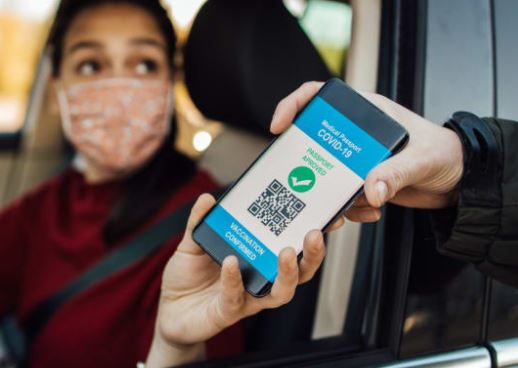As the COVID-19 delta variant spreads, many employers are requiring workers to show proof of their vaccination status or wear masks and submit to regular COVID-19 testing. Employment law attorneys recommend that businesses carefully craft vaccination policies, and they caution employers not to ask for too much information.
The U.S. Centers for Disease Control and Prevention (CDC) and many state public health authorities have recently relaxed COVID-19-related safety rules and recommendations for fully vaccinated people. But the highly transmissible delta variant has caused a surge in cases, prompting the CDC and other agencies to recommend that fully vaccinated people wear masks in certain indoor settings.
Additionally, in response to the spike in cases, the federal government and some state and local governments are requiring certain public employees, as well as those that work in health care and other high-risk settings, to show vaccination proof or submit to weekly COVID-19 testing, wear masks, and keep physically distant from other workers and visitors.
Many companies recently announced similar policies or said they plan to require all employees to get inoculated. Businesses that require vaccination or have different policies based on vaccination status will need to balance workplace safety policies and employee privacy considerations.
Here are some tips for employers that decide to ask workers for proof of their vaccination status.
Limit the Inquiry
Employers may have legitimate business reasons to ask employees about their vaccination status, but employers should be careful not to dig too deep into any inquiry, said Hannah Sweiss, an attorney with Fisher Phillips in Woodland Hills, Calif.
Stephen Riga, an attorney with Ogletree Deakins in Indianapolis, explained that employers should avoid making medical inquiries that could run afoul of the Americans with Disabilities Act (ADA). He noted, however, that simply asking for proof of a COVID-19 vaccination is permissible under the ADA because it is not likely to prompt the employee to provide disability-related information.
The U.S. Equal Employment Opportunity Commission (EEOC) said employees may decline to confirm their vaccination status for reasons that are unrelated to a disability. “Therefore, requesting documentation or other confirmation of vaccination by a third party in the community [such as a pharmacy or doctor] is not a disability-related inquiry under the ADA, and the ADA’s rules about such inquiries do not apply,” the agency said in updated FAQs.
“So essentially, the EEOC said you can ask about vaccination status,” Riga explained. But employers should refrain from asking follow-up questions about why an employee did not receive a vaccination. Such inquiries may elicit disability-related information, according to the EEOC, and would be subject to the ADA’s requirement that questions be “job-related and consistent with business necessity.”
If employers ask workers to provide vaccination proof from a pharmacy or health care provider, they “may want to warn the employee not to provide any medical information as part of the proof in order to avoid implicating the ADA,” the EEOC said.
Jason Habinsky, an attorney with Haynes and Boone in New York City, suggested that employers ask only for the bare minimum of supporting documentation, such as a vaccination card or a survey response.
Riga noted that employers should check applicable state law, too, which may differ from federal rules and guidelines. Additionally, if employers are requiring workers to get vaccinated, they will need to consider reasonable accommodations for employees with disability-related or sincerely held religious objections.
Maintain Confidentiality
The EEOC explained that any documentation or other confirmation that employees provide about their vaccination status is considered medical information and must be kept confidential.
If employers do require proof of vaccination, they should control access to the information and limit its use, Riga said.
Moreover, the data could be protected under state law. Sweiss said employers that are subject to the California Consumer Privacy Act should be aware that collecting such information likely triggers the law’s notice requirements. “So employers should ensure they have issued this notice when collecting vaccine-related information,” she noted.
Alexa Miller, an attorney with Faegre Drinker in Florham Park, N.J., said the best way to address employee privacy concerns is to communicate that such records will be strictly confidential and will not be used to make employment decisions.
Keep Policies Updated
“This is a rapidly changing environment,” Riga said. Federal, state and local authorities are adjusting their COVID-19 requirements regularly, which can have an impact on the business reasons why an employer might need to know an employee’s vaccination status.
“Be sure to keep up with the rules in your jurisdiction,” he said. “Establish a process for tracking vaccination status, and train your team to make sure you’re not making inquiries beyond what’s necessary.”
Employers will find it hard to have fixed policies and practices as the pandemic plays out, he said. So they need to “be nimble and remain nimble.”
Sweiss suggested that employers create consistent messaging to communicate their processes and develop some talking points in case they are faced with questions from customers or clients about employees’ vaccination status.
“We’re still in a state of flux,” said Pierce Blue, an attorney with Morgan Lewis in Washington, D.C. “So employers should continue to pay close attention to updated rules and guidelines coming from federal, state and local agencies.”

